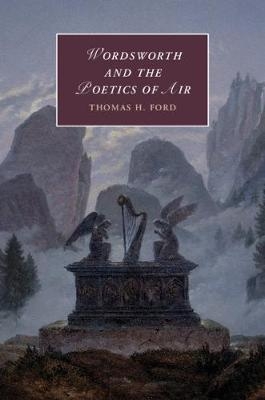
Wordsworth and the Poetics of Air
Seiten
2020
Cambridge University Press (Verlag)
978-1-108-44103-2 (ISBN)
Cambridge University Press (Verlag)
978-1-108-44103-2 (ISBN)
This book explores how the meaning of 'poetic atmosphere' developed within larger ideas of Romanticism, particularly through the poetry of William Wordsworth, who was the first to see its potential as metaphor. Thomas H. Ford here makes a significant contribution to debates in the areas of literary ecology and ecocriticism.
Before the ideas we now define as Romanticism took hold the word 'atmosphere' meant only the physical stuff of air; afterwards, it could mean almost anything, from a historical mood or spirit to the character or style of an artwork. Thomas H. Ford traces this shift of meaning, which he sees as first occurring in the poetry of William Wordsworth. Gradually 'air' and 'atmosphere' took on the new status of metaphor as Wordsworth and other poets re-imagined poetry as a textual area of aerial communication - conveying the breath of a transitory moment to other times and places via the printed page. Reading Romantic poetry through this ecological and ecocritical lens Ford goes on to ask what the poems of the Romantic period mean for us in a new age of climate change, when the relationship between physical climates and cultural, political and literary atmospheres is once again being transformed.
Before the ideas we now define as Romanticism took hold the word 'atmosphere' meant only the physical stuff of air; afterwards, it could mean almost anything, from a historical mood or spirit to the character or style of an artwork. Thomas H. Ford traces this shift of meaning, which he sees as first occurring in the poetry of William Wordsworth. Gradually 'air' and 'atmosphere' took on the new status of metaphor as Wordsworth and other poets re-imagined poetry as a textual area of aerial communication - conveying the breath of a transitory moment to other times and places via the printed page. Reading Romantic poetry through this ecological and ecocritical lens Ford goes on to ask what the poems of the Romantic period mean for us in a new age of climate change, when the relationship between physical climates and cultural, political and literary atmospheres is once again being transformed.
Thomas H. Ford is a Lecturer in the School of Culture and Communication at the University of Melbourne. He has translated Boris Groys's The Communist Postscript (2010), co-edited A Cultural History of Climate Change (2016), and had articles published in journals including New Literary History, ELH, European Romantic Review and Australian Literary Studies.
1. Atmospheric Romanticism; 2. Atmospheric mediation; 3. Romantic meteorology; 4. Atmospheric aesthetics; 5. In the breathing chamber: 'lines written a few miles above'.
| Erscheinungsdatum | 15.06.2020 |
|---|---|
| Reihe/Serie | Cambridge Studies in Romanticism |
| Zusatzinfo | Worked examples or Exercises; 6 Line drawings, black and white |
| Verlagsort | Cambridge |
| Sprache | englisch |
| Maße | 150 x 230 mm |
| Gewicht | 430 g |
| Themenwelt | Geisteswissenschaften ► Sprach- / Literaturwissenschaft ► Anglistik / Amerikanistik |
| Geisteswissenschaften ► Sprach- / Literaturwissenschaft ► Literaturgeschichte | |
| Geisteswissenschaften ► Sprach- / Literaturwissenschaft ► Literaturwissenschaft | |
| ISBN-10 | 1-108-44103-3 / 1108441033 |
| ISBN-13 | 978-1-108-44103-2 / 9781108441032 |
| Zustand | Neuware |
| Haben Sie eine Frage zum Produkt? |
Mehr entdecken
aus dem Bereich
aus dem Bereich
Poetik eines sozialen Urteils
Buch | Hardcover (2023)
De Gruyter (Verlag)
59,95 €
Buch | Softcover (2024)
belleville (Verlag)
20,00 €


